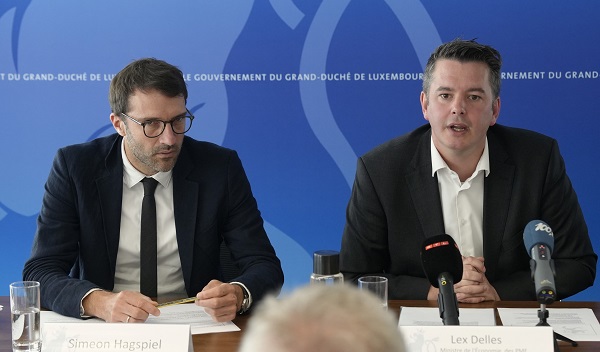 (L-R) Simeon Hagspiel, Luxembourg's Ministry of the Economy; Lex Delles, Luxembourg's Minister of the Economy, SMEs, Energy and Tourism;
Credit: MECO
(L-R) Simeon Hagspiel, Luxembourg's Ministry of the Economy; Lex Delles, Luxembourg's Minister of the Economy, SMEs, Energy and Tourism;
Credit: MECO
On Wednesday 9 July 2025, Luxembourg's Minister of the Economy, SMEs, Energy and Tourism, Lex Delles, presented the strategic roadmap for the promotion and development of electricity storage batteries in Luxembourg: "Späicherstrategie Lëtzebuerg".
This strategy outlines the role of storage batteries in the national electricity system, identifies the challenges to be addressed and proposes 20 concrete measures to facilitate the deployment of batteries in Luxembourg. It aims to maximise their added value for end consumers and for the entire electricity system by improving its flexibility, resilience and efficiency.
According to Luxembourg's Ministry of the Economy, this approach aligns with the integrated national energy and climate plan and the objectives set by the 2023-2028 coalition agreement. It is also linked to the broader "Einfach Séier Erneierbar" process.
Electricity storage batteries are playing an increasingly important role in the electricity system and are considered an essential element for a reliable, sustainable and affordable electricity supply. In particular, they help meet the increased need for grid flexibility, driven by the energy transition and the development of renewable energy sources.
Minister Delles commented: "Batteries have a key role to play in the transition to a decarbonised, flexible and resilient energy system. Thanks to their unique characteristics, they contribute to grid balance and promote the integration of renewable energies."
"For them to fully play this role, their deployment must be compatible with the grid and coordinated with the system's needs, in order to strengthen their collective utility. Hence the importance of having a clear and ambitious strategy, capable of supervising this development and maximising its benefits for the entire country," he added.
Between 17 March and 20 April 2025, the Ministry of the Economy conducted a public consultation via the zesumme-vereinfachen.lu portal to gather opinions from the sector. The consultation confirmed a strong interest in the development of batteries and the need to establish a more structured and incentive-based framework.
The strategy is based on 20 concrete measures, grouped into five areas:
- Strategic framework: three measures aimed at ensuring the systematic integration of battery storage solutions into all relevant areas of the energy sector. They also aim to precisely define future system flexibility requirements;
- Efficient system integration: six measures aimed at addressing technical and informational challenges, aligning sector practices and ensuring grid-friendly integration of batteries into the national electricity grid;
- Grid tariff structure: two measures aimed at conducting an in-depth analysis of the grid tariff, with a specific focus on the specific characteristics of storage batteries. The objective is to identify a tariff model that encourages grid-friendly integration of batteries while taking into account the needs and constraints of the electricity system;
- Financial support: six measures aimed at reducing investment costs and encouraging innovation, including the introduction of new financial support for home energy management systems as part of the overhaul of the "Klimabonus Wunnen" subsidy scheme;
- Improving information, awareness and support: three measures aimed at strengthening awareness and disseminating technical and regulatory knowledge. The objective is to ensure a better understanding of the requirements related to battery integration and to promote their deployment in a coherent, efficient manner and in line with the needs of the energy system.
These measures are designed to remove obstacles to battery deployment in Luxembourg and aim to generate more initiatives and activities in this sector in the short and medium term.
A monitoring group will be established and will meet every six months. Its mission will be to inform stakeholders on the progress of the measures, facilitate experience sharing and support the development of the sector. An overall evaluation of the strategy is planned for mid-2027.
Participants in the public consultation will be invited to join the monitoring group. Other interested stakeholders can contact the Directorate General for Energy of the Ministry of the Economy via email: spaicherstrategie@eco.etat.lu.








